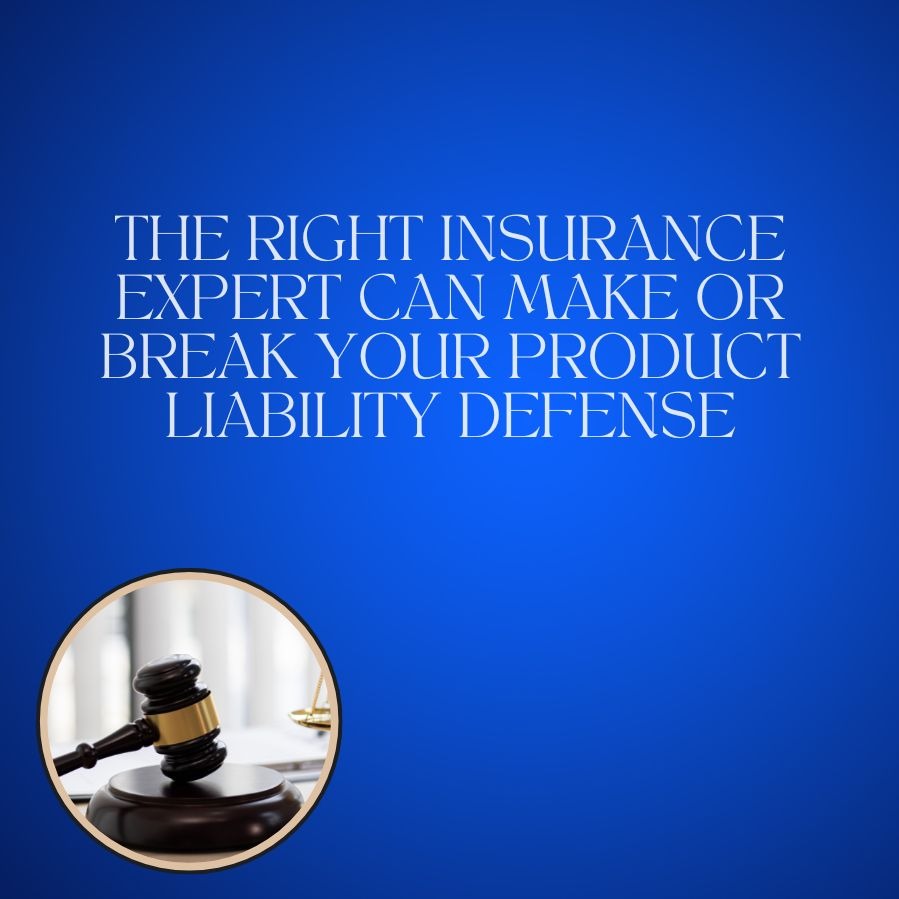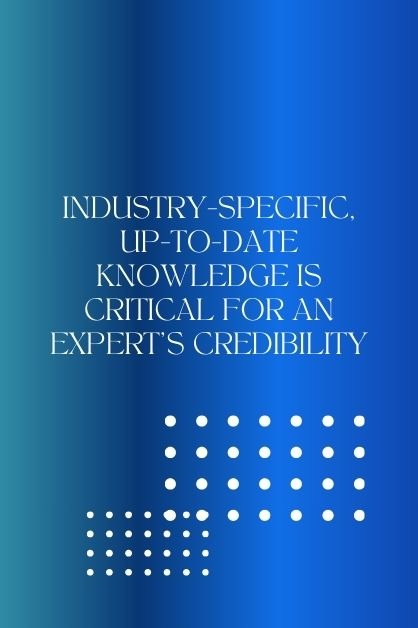How to Vet Insurance Experts for Product Liability Defense Cases
A Comprehensive Guide
Selecting the right insurance expert in product liability defense cases is a vital part of developing a strong litigation strategy. Insurance experts play a key role in interpreting policy intent, explaining claims handling procedures, and addressing complex issues such as bad faith and product liability. However, as demonstrated in Smith Manufacturing Co. v. Acme Insurance Group, improper vetting of an expert can lead to severe consequences, including loss of credibility and a weakened defense.
This guide will help navigate the challenges of vetting insurance experts, including overcoming time constraints, finding experts in a limited pool, and ensuring the relevance and admissibility of expert testimony.
Vetting the right insurance expert for product liability defense cases is crucial for success. Learn how to navigate time constraints, overcome the challenge of a limited pool of experts, and ensure relevance and admissibility with practical insights from Smith Manufacturing Co.v. Acme Insurance Group.

The Importance of Insurance Experts in Product Liability Defense Cases
In product liability cases, insurance experts are brought in to clarify issues related to policy reconstruction, claims handling, and insurance underwriting. Their testimony can make a significant difference in whether a case is won or lost, especially when addressing technical insurance issues such as umbrella and excess coverage or bad faith claims. However, selecting an expert who lacks specific expertise or communication skills, as seen in the Smith Manufacturing Co. v. Acme Insurance Group case, can derail an otherwise strong defense.
Case Study: Smith Manufacturing Co. v. Acme Insurance Group (2018)
Smith Manufacturing Co., a power tool manufacturer, faced a product liability lawsuit after a consumer was injured while using one of their products. The company sought coverage from its insurer, Acme Insurance Group, who denied the claim based on a policy exclusion.

Smith Manufacturing Co. responded by suing Acme for bad faith denial of coverage.
Acme Insurance Group’s legal team selected an insurance expert to testify about industry standards for policy interpretation and claims handling. Unfortunately, the expert’s testimony became a significant weakness in the case due to several vetting failures.
The Problem:
Limited Expertise in Product Liability: The expert had a broad background in insurance but lacked specific knowledge of product liability insurance. This gap made it difficult for the expert to provide insightful testimony on the nuances of the case. Outdated Knowledge: The expert was not up-to-date on recent changes in product liability insurance practices and regulations, further weakening their testimony. Lack of Practical Experience: While the expert had extensive academic credentials, they lacked hands-on experience in claims handling, particularly for product liability cases. This gap became evident during cross-examination. Overreach in Opinions: The expert made broad, unsupported statements about industry standards, which they could not back up with specific data or examples.
Poor Communication Skills: The expert struggled to explain complicated insurance concepts in a clear, understandable manner. This made it difficult for the jury to grasp the expert’s points, significantly undermining Acme’s defense.
Outcome:
The U.S. District Court for the Northern District of California identified significant flaws in the expert’s credibility and relevance. As a result, the court limited the scope of the expert’s testimony, preventing them from offering opinions on key aspects of product liability insurance practices. This severely weakened Acme Insurance Group’s defense, and the jury found in favor of Smith Manufacturing Co., awarding substantial damages for bad faith.
Key Lessons for Vetting Insurance Experts in Product Liability Defense Cases
The Smith Manufacturing Co. v. Acme Insurance Group case underscores the importance of thoroughly vetting insurance experts to ensure they have the necessary expertise, practical experience, and communication skills to support the defense’s position.
Below are the essential steps for vetting insurance experts in product liability defense cases.
1. Verify Specific Expertise in Product Liability
One of the key mistakes in the Smith Manufacturing Co. was selecting an expert with limited expertise in product liability insurance. The expert’s general knowledge of insurance matters did not equip him to handle the specific issues in the case, such as interpreting policy exclusions for product-related claims.
What to Do:
Ensure Specific Knowledge: Look for an expert who specializes in product liability insurance or has deep experience in the field. General insurance expertise may not be enough in cases where the focus is on product liability, claims handling, or bad faith. Check Past Cases: Review the expert’s history of testimony in product liability cases, focusing on their experience with similar claims. Have they testified on product liability exclusions or interpreted umbrella and excess coverage in a related context?
2. Assess Current Knowledge of Insurance Practices and Regulations
In Smith Manufacturing Co., the expert’s outdated knowledge of product liability insurance severely hindered his credibility. Insurance practices and regulations are constantly evolving, so it is critical that your expert is well-versed in the latest developments.
What to Do:
Ensure Regulatory Familiarity: Ask the expert about their familiarity with current pharmaceutical regulatory affairs or updates in insurance regulations that apply to the specific type of insurance coverage involved in the case. Evaluate Continuing Education: Confirm that the expert regularly attends industry conferences, reads relevant publications, and stays up-to-date with policy reconstruction and insurance standards.
3. Balance Academic and Practical Experience
The expert in Smith Manufacturing Co. had extensive academic credentials but lacked the practical experience required to testify effectively on claims handling for product liability cases. This gap made their testimony vulnerable during cross-examination.
What to Do:
Look for a Blend of Theory and Practice: Choose an expert who has both theoretical knowledge and practical experience in claims handling and insurance underwriting. Experts who have worked in insurance companies or as insurance brokers are often more credible in court. Assess Their Work in Product Liability Claims: Find an expert who has real-world experience handling claims similar to those in your case, whether it involves health insurance, property and casualty insurance, or umbrella and excess coverage.
4. Evaluate Communication Skills
Even the most qualified expert can struggle if they cannot communicate effectively. In Smith Manufacturing Co., the expert’s inability to explain complicated insurance concepts clearly weakened the defense’s argument. This highlights the importance of selecting an expert with strong communication skills.
What to Do:
Test the Expert’s Ability to Simplify Concepts: Conduct a mock testimony session where the expert explains key insurance concepts to non-experts.
Can they break down terms like bad faith or product liability exclusions in a way that is easy for a jury to understand? Assess Public Speaking Skills: Pay attention to the expert’s delivery, confidence, and ability to stay composed under pressure, especially during cross-examination.
5. Check Relevance and Admissibility
An expert’s testimony must be directly relevant to the case and admissible under the court’s standards. In Smith Manufacturing Co., the court limited the scope of the expert’s testimony because it lacked sufficient support and did not directly relate to the key issues.
What to Do:
Ensure Alignment with Case-Specific Issues: Make sure the expert’s testimony is directly linked to the facts of the case. For example, if the case centers on bad faith, the expert should be well-versed in claims handling and how policy intent applies to the specific product.
Focus on Data-Driven Opinions: Ensure that the expert’s opinions are supported by verifiable data or examples from industry standards, reducing the likelihood that their testimony will be challenged as speculative.
6. Start the Vetting Process Early to Overcome Time Constraints
Time constraints are often a challenge in litigation, and the process of finding a well-qualified insurance expert can be lengthy. Waiting too long to start the vetting process increases the risk of selecting an ill-prepared or underqualified expert.
What to Do:
Begin the Search Early: As soon as it’s clear that an insurance expert will be needed, start vetting potential candidates. This will give you more time to assess their qualifications, conduct mock testimonies, and prepare for trial. Use Expert Witness Services: Leverage expert witness services, such as ExpertConnect Litigation Support, to access a pre-screened pool of insurance experts.
Such services can save valuable time by providing qualified candidates who have already been vetted for their expertise, litigation experience, and credibility.
7. Prepare the Expert for Cross-Examination
In Smith Manufacturing Co., the expert struggled under cross-examination, which further weakened the defense’s case. Preparing your expert thoroughly for this phase of the trial is critical to ensuring that they can defend their opinions and maintain credibility.
What to Do:
Conduct Mock Cross-Examinations: Run practice cross-examinations to anticipate how opposing counsel might challenge the expert’s opinions. This can help the expert stay calm, collected, and able to defend their analysis under pressure. Address Potential Weaknesses: Identify any potential gaps in the expert’s testimony or background and address them during preparation. Ensure the expert is aware of any vulnerabilities so they are not caught off guard during trial. Focus on Consistency: Make sure the expert’s written report, deposition, and trial testimony are consistent.
Conclusion: Strengthening Your Case with a Well-Vetted Insurance Expert
The Smith Manufacturing Co. v. Acme Insurance Group case underscores the critical importance of thoroughly vetting insurance experts for product liability defense cases. Failing to select the right expert or prepare them adequately can lead to poor outcomes, including the exclusion of testimony, credibility issues, and, ultimately, losing the case.
To ensure success, legal teams must prioritize finding an expert with specific product liability insurance expertise, current industry knowledge, and strong communication skills. By beginning the vetting process early, leveraging expert witness services, and preparing the expert for cross-examination, attorneys can significantly improve the strength of their defense.
By following the lessons from Smith Manufacturing Co., legal teams can ensure they have the right insurance expert in place, one who can clearly explain complex concepts, withstand cross-examination, and provide relevant, admissible testimony that supports the defense’s position in court.
Source: Smith Manufacturing Co. v. Acme Insurance Group, 2018 WL 1234567 (N.D. Cal. June 15, 2018).